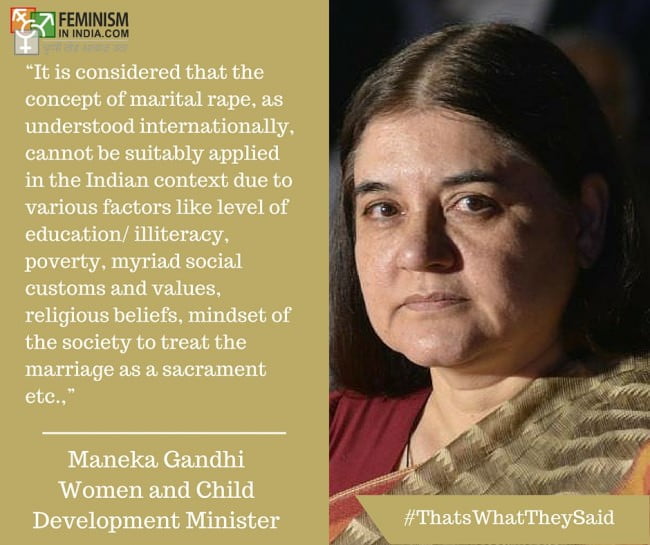The penalty for rape in India in the Indian Penal Code categorically excludes marital rape from Section 375,
“Sexual intercourse by man with his own wife, the wife not being under 15 years of
age, is not rape.”
Now the IPC does consider the forceful insertion of the penis or any other object into an orifice rape. Why does it matter how old the woman is, and what her marital status is?
Well, Women and Child Development Minister Maneka Gandha recently re-released a Government statement that said that criminalising marital rape in India would be far too difficult. This is because,
“the concept of marital rape, as understood internationally, cannot be suitably applied in the Indian context due to various factors like level of education/illiteracy, poverty, myriad social customs and values, religious beliefs, mindset of the society to treat the marriage as a sacrament etc.”
This is not a new stance that has been taken under the BJP regime, it is one that has been taken by the Government of India in its multiple forms. It is a commonly held concept in India that it will be good for women like me to be a part of an institution in which we can be forced, against our will, to spread our legs and perform our wifely duties by allowing our husbands to insert whatever they so desires into our vaginas (or other orifices). But let’s break down the exact statement released by Maneka Gandhi, and what it implies:
1. Marital rape is an ‘international concept’
Forced sexual activity without the consent of both partners is understood to be rape. The 1993 publication of the Declaration on the Elimination of Violence Against Women by the United Nations High Commissioner for Human Rights established marital rape as a human rights violation. The importance of a woman’s right to choose her sexual partner was reiterated by High Commissioner for Human Rights Navi Pillay in 2012, saying that:
“Violations of women’s human rights are often linked to their sexuality and reproductive role. (…) In many countries, married women may not refuse to have sexual relations with their husbands, and often have no say in whether they use contraception. (…) Ensuring that women have full autonomy over their bodies is the first crucial step towards achieving substantive equality between women and men. Personal issues—such as when, how and with whom they choose to have sex, and when, how and with whom they choose to have children—are at the heart of living a life in dignity.”
If one is to employ the ‘international concept’ of marital rape in India, two-thirds of married Indian women seem to have been forced to have sexual intercourse with their husbands according to a report released by the UNFPA in 2000. If this report seems dated, a study conducted in 2011 by the International Centere for Research on Women shows that one in every five Indian men surveyed admitted to forcing their wives into non-consensual sex. Women who suffer physical abuse are far more likely to be raped. None of these women are going to report it, because none of them can. They cannot call a rapist a rapist because according to the IPC, they cannot be raped.
The statement released by Maneka Gandhi implies that the ideas of agency and autonomy for women are “international concepts” that cannot apply to women in India. But what makes the concept ‘international?’ Why is it that Indian women are denied their rights to their own bodies? It is the Brahminical patriarchy in which our laws are nested. If one is to consider a woman an autonomous agent, one can no longer dictate her role in reproducing the hegemonic constructions of the casteist order, her ‘duty’ in the ‘sacrament of marriage.’
2. Marital Rape in ‘the sacrament of marriage’
Maneka Gandhi’s statement cites the difficulty of “the mindset of the society to treat the marriage as a sacrament.” So what exactly does the sacrament of marriage entail?
According to the report on the Criminal Law Amendment Bill, presented at the Rajya Sabha in 2013, those who argued against the legalisation of marital rape claimed that “marital rape has the potential of destroying the institution of marriage… It was, therefore, felt that if the marital rape is brought under the law, the entire family system will be under great stress and the Committee may perhaps be doing more injustice.”
These two sentences really sum up the systemic, institutionalised patriarchy that we live, labour, and are expected to love under. ‘The sacrament of marriage’ is apparently predicated upon sex as a wifely duty, so much so that, in 2012 the Karnataka High Court said so while granting a divorce, “The wife is unwilling to share the bed and discharge her duties.” The judge went on to add that this violated the Hindu Marriage Act. While sexual incompatibility is not an unfair ground on which to end a marriage, citing sexual compliance as a duty is shameful for a legal institution that is supposed to protect the freedom and the autonomy of the citizens of the state.
Because if we break it down, they’re basically saying that we cannot consider a wife an autonomous being with her own individual needs, wants, and desires. Her individual freedoms are non-existent in the context of her being a wife. Her husband chooses to see what activities are fit for her to be engaged in. Her consent means nothing, because she is nothing more than her husband’s possession – and objects cannot have feelings, let alone express them.
It is perfectly reasonable and possible, and, in fact, desirable to have a marriage based on mutual respect and equality. But the institution of marriage that India seems to want to preserve is one in which the subservient wife recognises her place – irrelevant in comparison to the dominant male in her life. Her role is to perform her wifely duties of fulfilling her husband’s sexual pleasures and reproducing the casteist order by producing her husband’s children. Considering a woman’s agency doesn’t run the risk of destroying the ‘institution of marriage’, but it does certainly begin to destroy the institution of the Brahminical patriarchy.
The report on the presentation of the Criminal Law Amendment Bill goes on to recommend that a woman, “if aggrieved“, has other ways in which she can approach the courts. But why can’t she call a spade a spade, and a rapist a rapist? Indian law makers would rather that she call it domestic violence, if anything at all. While domestic violence is in itself, no way a trivial problem, it is not necessarily the same thing as rape. The two can exist mutually exclusively – a loving husband who has never harmed his wife can decide that he wants to ‘show her’ his love when she’d rather not interact with it in that form; a wife beater can be entirely disinterested in his wife’s orifices. Regarding marital rape as domestic violence is refusing to acknowledge that it can occur – refusing to accept a married woman’s sexual autonomy.
3. “Various factors like level of education/illiteracy, poverty, myriad social customs and values, religious beliefs”
What is first being implied here is the idea that there are certain types of individuals who are more prone to raping their wives than others. The conceptualisation of the rapist in middle-class India is typically one of a lower-class, perhaps lower-caste man who preys on middle and upper class women. In Why Loiter, Shilpa Phadke et al argue that this narrative is conveniently deployed in making sure that lower-class men are cleared off the streets while middle/upper-class women are kept ‘safe’ indoors.
The level of education/illiteracy and poverty are not the causes of marital rape. A woman’s inability to justiciable rights to her own body, however, are.
Finally, the separation between universal codes and religious personal laws arguably defend the multi-cultural nature of Indian society. The 2012 case in the Karnataka High Court stated that a married woman’s lack of participation in sexual activity violated the Hindu Marriage Act. But the Indian Constitution also promises an equality before law. Regardless of social customs and beliefs, shouldn’t a woman be allowed a right to her own body?
Ultimately, ‘religious beliefs’ is a thinly veiled defence of the Brahminical patriarchy that decides who women can have sex with, and why.
Marital Rape is Rape
It should be obvious to anyone that consent is not just important, it’s enjoyable. It isn’t that our lawmakers are unaware of the fact that women do not always consent to sexual activity, but it seems as though they believe that, when women are married, consent is not necessary.
Aside from believing that marriage entails permanent consent, they claim that marital rape is hard to prove, considering that evidence of penetration is not enough to establish it. Is that not the same argument they make against all rape? That the woman was ‘asking for it’ or ‘seduced them’ and then changed their mind? And do we not (at least, on paper) acknowledge that unmarried women can be raped? Why not married women?
Any forced sexual act without consent is rape. Whether the person is five, fifteen, or fifty; single, married, dating, or divorced – and whether the person is female or male, but that’s a rant for another day.
Forced sexual activity without the consent of both partners is rape. Marital rape is rape.
About the author(s)
Bhamini is a Masters student who alternates between working on her dissertation and getting worked up by the state of the world. She writes in an attempt to translate feminist discourses from academia to plainspeak.





How about Criminalizing marital loot and extortion(in form of maintenance and alimony during subsistence of marriage and after divorce) of husband as prescribed u/s CrPC 125, u/s 18 of Hindu Adoption and maintenance Act, under various sections of Hindu marriage Act? After all, Consent should be explicit in not only in sexual matters but all aspects of life including economic matters and husband should not be economically expoited in form of forcing him to maintain her wife in any way if he says NO to maintain her. I hope supporters of sexual and bodily autonomy will also respect economic autonomy of men.
And at present, rape law is gender specific and after 2013 amendment, inserting finger into vagina without consent is rape, which effectively means even touching it by fingers. If exception in sec 375 is removed, such acts of husband will become punishable u/s 376. Now, if that will be the case then what punishment and by which law will be given to wife if she touches the genitals of her husband without his explicit consent??
Moving a step further in ensuring bodily autonomy, can our law also prohibit something called ‘marital molestation’ with gender neutral prospective? Like if one partner cuddle another one who is still sleeping should be considered as molestation?
And after criminalizing of so called marital rape, will impotency of husband remain a ground of divorce for wife? If yes, then it will be double edged sword over husbands. If you have sex without ur wife consent, u will go to jail for atleast 7 years and if you can’t have sex with your wife on her desire you will be divorced along with shelling out your hard earned income towards alimony. It effectively means sexual cum economic slavery of men for their wives.